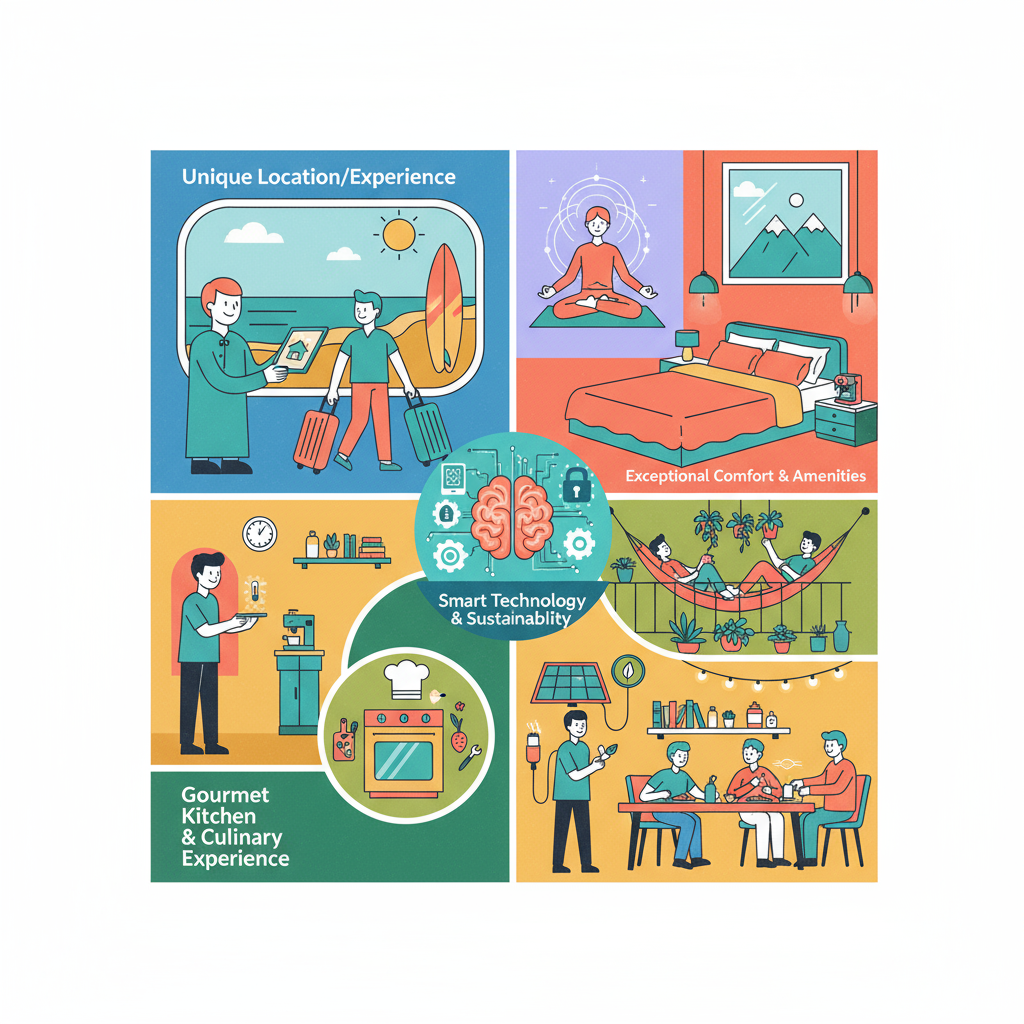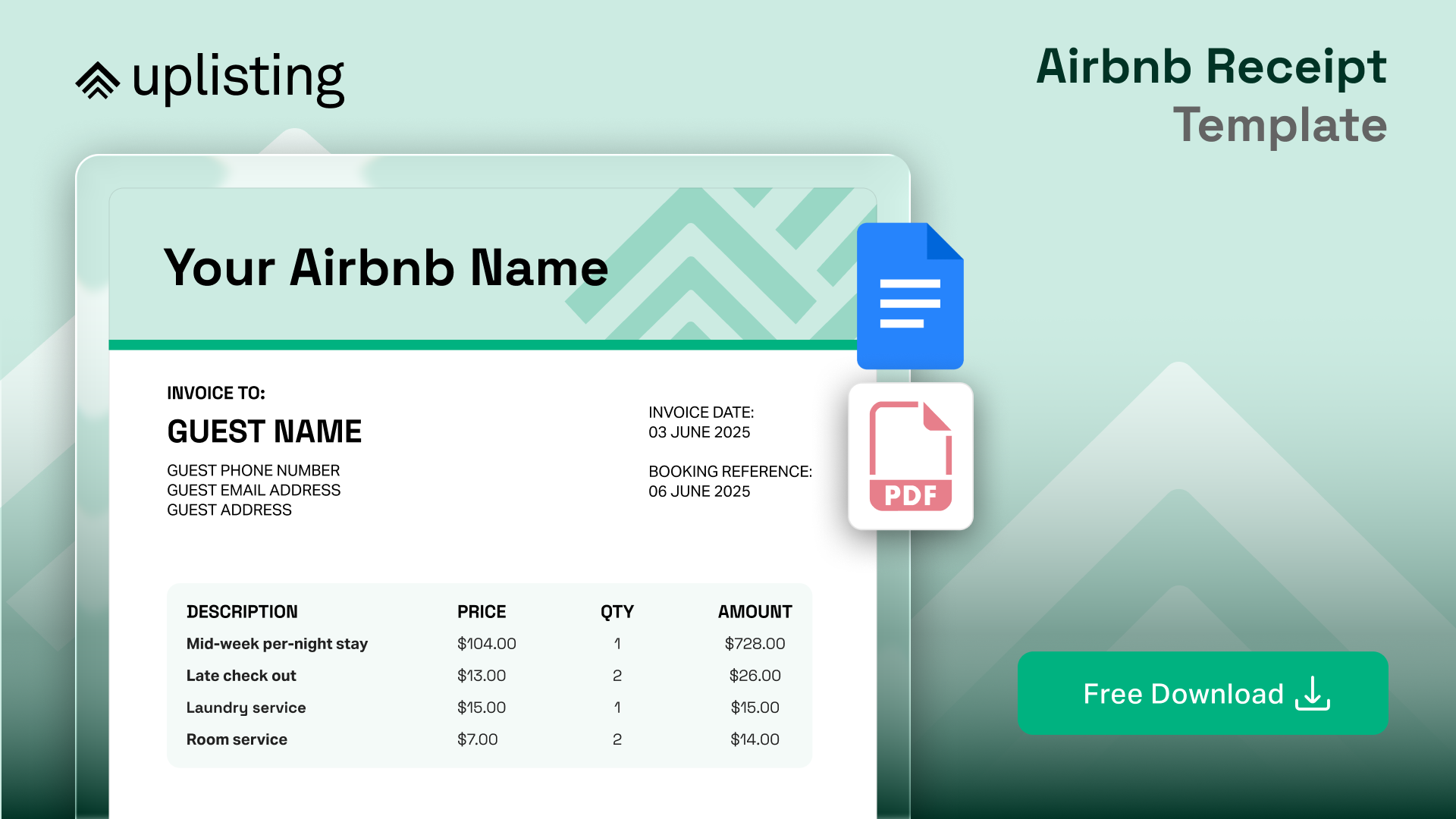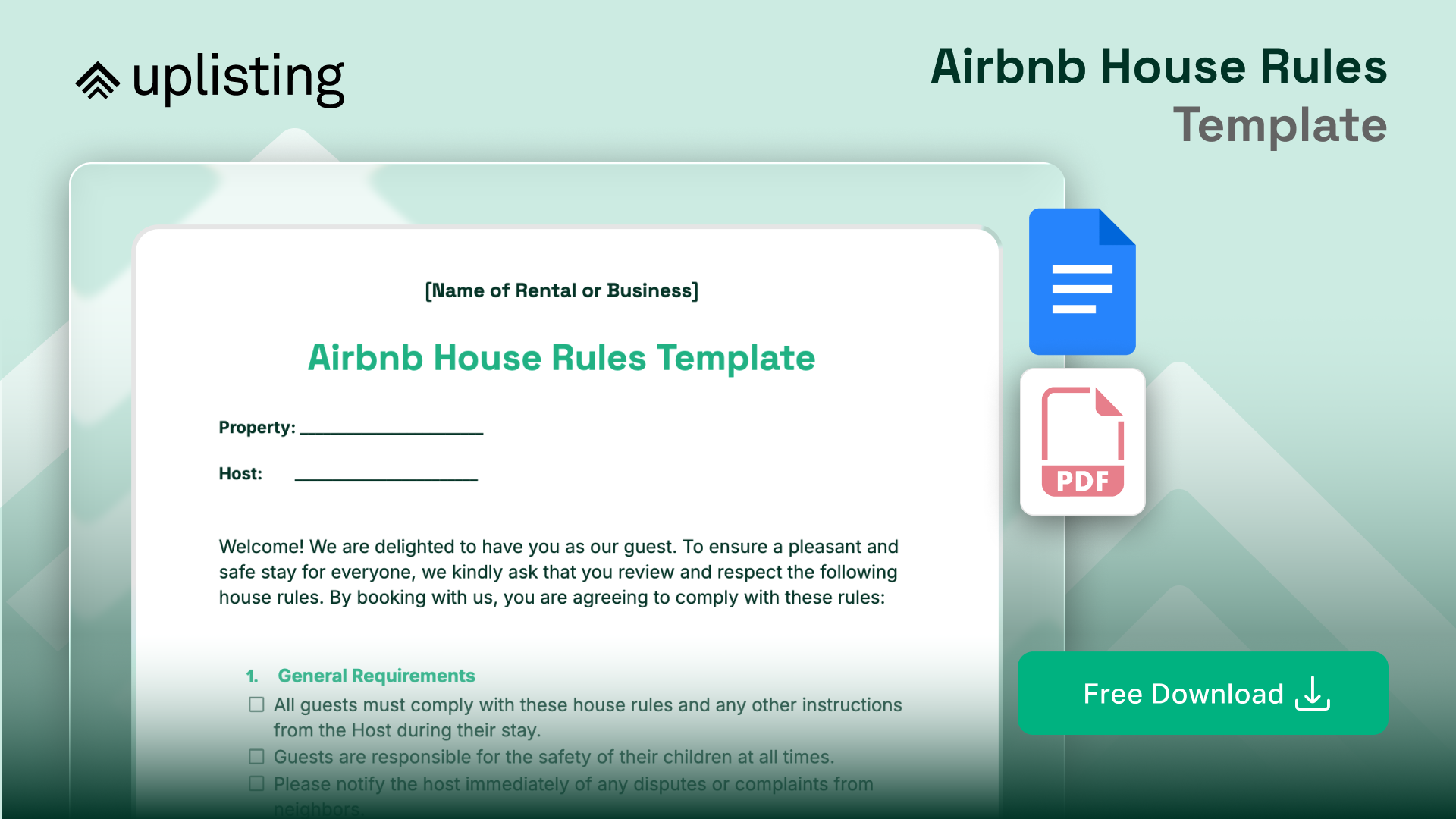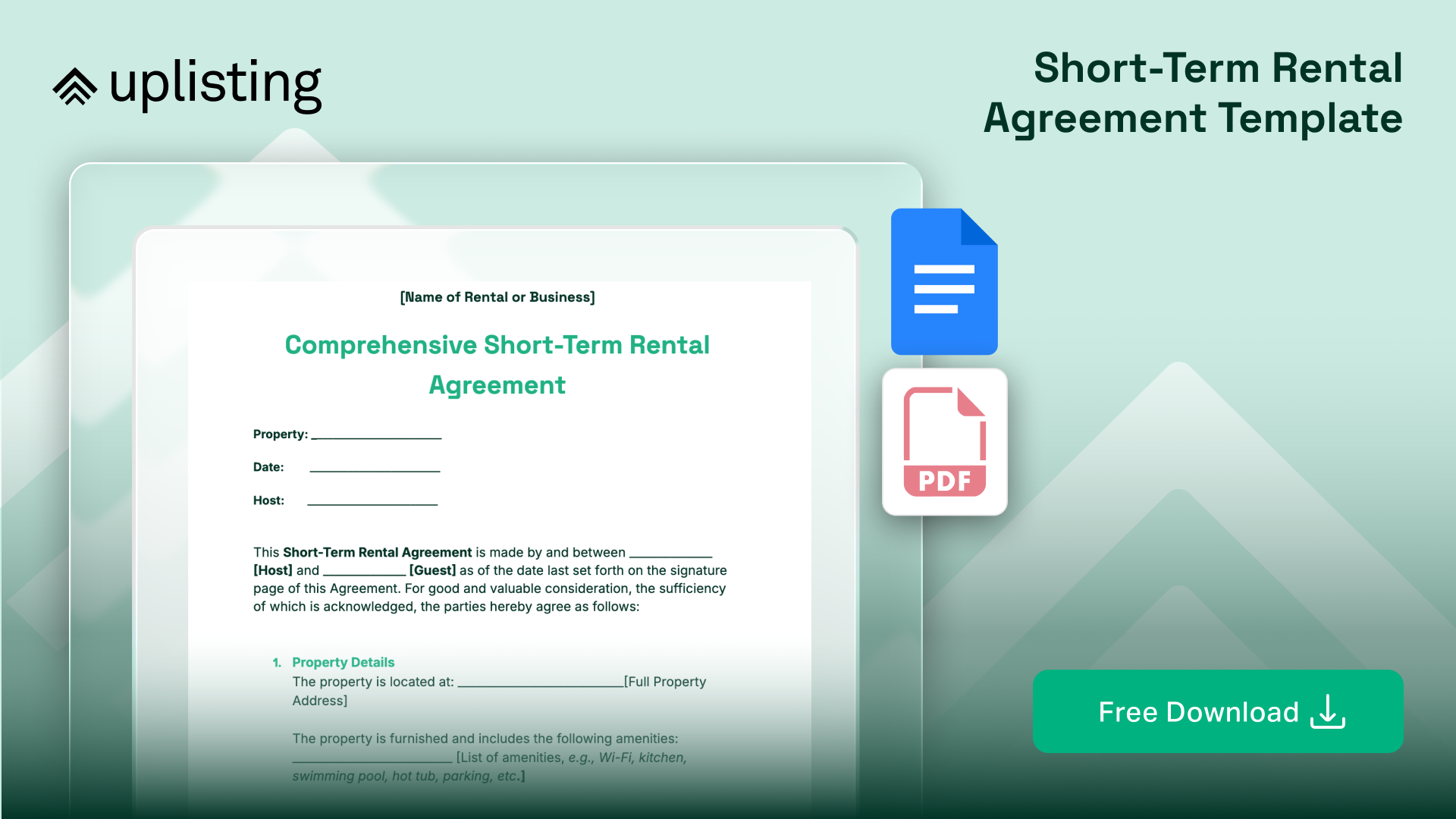Key Takeaways
Research the legal, financial, and lease-related requirements prior to listing your apartment on Airbnb
Rental arbitrage can unlock income potential without owning property
Don't forget to look into zoning laws that impact your ability to host legally
Starting out as a short-term rental host can feel overwhelming, especially when you're not sure if you're even allowed to list your apartment in the first place. Between lease agreements, city ordinances, and platform requirements, not having a firm understanding of the rules could cost you time, money—or your unit entirely.
This guide breaks down exactly what you need to know before listing your apartment on Airbnb. We’ll get into the legal, the fine print in leases, and the financial upside of rental arbitrage that could make all of this worth it.
Lease Review and Landlord Approval
Start with the lease.
Many leases block short-term rentals outright. Others leave room for negotiation, but you’ll need written permission. Skipping this step can lead to fines, eviction, or worse (especially in buildings with strict oversight).
Landlords usually say no because they worry about additional liability, noise complaints, and damage. Many will often say yes, though, when you give them a reason to.
If you're already paying on time and handling small repairs, a short-term rental pitch can land provided that it's clear and organized. Show how the setup works, how you’ll screen guests, and how you’ll keep the unit quiet and clean between stays.
How to approach landlord approval
A clear pitch beats a casual ask every time. Instead of hoping for a yes, offer a well-thought-out plan. Explain how you’ll manage bookings, prevent problems, and make it easy for neighbors and building staff. The more structured your approach, the more likely your landlord sees it as low effort, low risk.
Profit-sharing: Offer a fixed monthly amount or a percentage of each booking. When income increases, so does their interest.
Additional deposit: Add a second deposit to cover guest-related damage or rule violations. It shows you’re serious about protecting the property.
Defined limits: Set boundaries on guest stays such as weekends only or a maximum number of nights per month. Fewer check-ins means less disruption.
Legal protections for both sides
Once a landlord agrees, put everything in writing. Don't rely on informal promises, as these don’t help when things go sideways or if building management changes. A lease addendum works best. Outline responsibilities, damage procedures, and what happens if either side wants to back out.
Include a liability waiver to protect the landlord from guest-related claims. This is often the sticking point, and a simple form can move things forward. Handling agreements and legal protections up front gives both parties peace of mind.
Save yourself from your inbox
Automate with Uplisting
Automated guest messages keep your guest informed from booking through to check-out. They’re designed to answer questions before they arise, saving you time whilst keeping your guests happy.
Research All Financial and Legal Risks
Listing your apartment on Airbnb without proper approvals turns what seems like an easy income stream into potential legal quicksand. Cities actively monitor listings, landlords enforce lease terms, and housing authorities impose steep penalties, with enforcement becoming increasingly sophisticated and aggressive.
As such, you'll need to ensure that you have a firm grasp of all the other financial and legal considerations.
Penalties for unauthorized hosting
Running short-term rentals without permission often leads to daily fines that add up quickly. Many cities monitor listings by comparing utility data, business licenses, and lease records, so trying to stay hidden usually doesn’t last long. In rent-controlled or subsidized housing, short-term rentals often violate housing terms entirely, which puts your lease on the line.
Some landlords won’t wait for a second offense. If a lease bans short-term stays, one complaint from a neighbor or a noise violation can lead directly to eviction. Even in buildings with flexible policies, property owners usually act fast if complaints start stacking up.
How to stay compliant
Avoiding penalties starts with knowing what your city, building, and lease all allow.
Many municipalities require a short-term rental license or business registration before you can legally host guests. In some areas, only owner-occupied units qualify. Others limit the number of nights per year or require you to live on-site.
Before launching a listing, check:
Zoning rules: Some neighborhoods or residential buildings ban short-term rentals outright. Others limit them to specific zones.
Permit requirements: Many cities require a license or registration number displayed directly on the listing.
Occupancy limits: Local laws often cap the number of guests based on square footage or bedroom count.
Tax obligations: Most jurisdictions charge occupancy or lodging taxes. Some booking platforms collect them automatically, but many don’t.
Knowing the rules ahead of time gives you more control.
The Fun Part: Setting Up Your Airbnb
Once you’ve cleared up the details of your lease and addressed any zoning requirements, it’s time to get your listing guest-ready. The expectations you set for your guests before they arrive is what determines whether they click, book, and leave five stars.
Start by creating your Airbnb host account.
You’ll need to verify your identity, upload a profile photo, and connect payout details. In some cities, you may also go through a background check or submit tax information. Keep your profile clean, accurate, and professional—guests are trusting you with their trip, and anything that looks off can hurt your visibility from day one.
Writing the listing and house rules
Your listing description should be clear and specific.
Lead with standout features like an extra workspace, walkability, high ceilings, or a private patio. Skip vague adjectives and general praise. Instead, help guests picture the stay. Break your description into short paragraphs, and write like you’re talking to someone who’s skimming on their phone during lunch.
House rules protect you and your space. Spell out quiet hours, smoking policies, guest limits, and check-in/out times. Post rules in the listing and inside the apartment so guests always know what’s expected. No guessing, no excuses.
Take photos that impress and convert
Photos drive bookings. Most guests scroll long before they read anything. Use natural light, avoid clutter, and shoot at eye level. Add wide shots of each room and close-ups of useful features like kitchen appliances or charging stations. Show what’s included, not just what looks good. If you’re not hiring a photographer, use a newer phone and make sure lighting is consistent across every shot.
When someone has ten tabs open, your photos need to literally stop the scroll.
Insurance considerations
Before welcoming guests, check your coverage.
Airbnb includes AirCover which offers up to $3 million in damage protection and $1 million in liability insurance. It’s built in, but it doesn’t cover everything.
Standard renters insurance usually excludes anything tied to short-term rentals. If you’re renting, ask your provider if a short-term rental rider is available. If you’re subleasing, make sure the landlord’s policy doesn’t conflict with your activity.
Pricing strategy
Running an Airbnb means thinking like a business owner. Calculate your monthly expenses first: rent, utilities, platform fees, taxes, cleaning supplies, and consumables. Then add your desired profit margin to find your true breakeven point. Setting rates below this threshold actively eats into your bottom line.
Pro tip: use dynamic pricing tools to stay competitive. These adjust your rates based on seasonality, demand, and local events. Manual pricing works for a single listing in the short term, but it’s hard to keep up once bookings start rolling in. Miss a surge week, and you’re leaving money on the table. Price too high during a slow month, and your listing sinks in search results.

Create 5-star guest experiences
Give your guests unforgettable experiences
With Uplisting, you can send the right messages at the right time on all booking sites. Read and respond to guest messages in a single, unified inbox — whether you’re at the office or on the go.
Managing Bookings and Daily Tasks
Once your listing goes live, everything behind the scenes starts to matter. Calendars, guest messages, and turnovers all demand attention, and skipping any one of them can throw the whole operation off. You don’t need to refresh tabs all day, but you do need systems that run without babysitting them.
One double booking is enough to cause a cancellation, refund, and a review you can’t erase. Syncing your calendar across Airbnb, Vrbo, and direct booking sites keeps your availability accurate and prevents overlap. Platforms won’t catch conflicts for you, so syncing in real time is the only way to avoid missing a beat.
Guest communication can eat up hours fast. Instead of writing the same message twenty times a week, automate your welcome notes, check-in instructions, and mid-stay reminders. Pre-scheduled messages make responses feel instant even when you're offline. Guests stay informed, and you stay out of your inbox.
Guest screening and review strategy
Choosing the right guests starts before they book. Airbnb profiles and host reviews help filter out high-risk stays. Prioritize guests with verified IDs, strong ratings, and clear communication. Short, vague messages usually signal trouble. Asking a few direct questions before accepting a booking keeps expectations clear on both sides.
After checkout, reviews give you control over future bookings. Honest feedback sets the tone for who books next. Hosts use your review just like you used theirs, so the more specific you are, the easier it becomes to avoid repeat issues. Think of each review as a filter, not a formality.
Staying in sync across platforms
Managing more than one listing? Trying to bounce between Airbnb, Vrbo, and a direct booking site without a central system usually leads to mistakes. Channel management tools bring everything into one place—bookings, messages, calendar blocks—so you’re not flipping between platforms or missing new reservations.
Booking updates in real time help you stay ready. New reservation? Your calendar updates instantly, availability disappears across booking sites, and your cleaner gets the schedule. No back-and-forth texts, no missed turnovers. You see who’s coming, when they’re leaving, and what prep needs to happen.
Tracking performance without spreadsheets
Revenue tracking tells you what’s working. You see occupancy, nightly rates, and income per available night in one place. If a listing lags behind, you can trace the issue to poor timing, weak reviews, or missed price adjustments. If one outperforms the rest, you can repeat that setup across other units.
When you're wondering, “can I rent my apartment on Airbnb and actually make money?” performance tracking gives a clear answer. No guesswork. Just numbers that show whether you’re making progress or spinning your wheels.
Wrapping Up
Renting your apartment on Airbnb can be a profitable move, as long as it's done legally and strategically. A strong operational foundation protects your lease, keeps guests happy, and positions your apartment as a long-term revenue stream. Every step matters when setting up a short-term rental that runs smoothly and stays compliant.
Once your listing is live, the real work begins behind the scenes.
Managing bookings, automating communication, and staying aligned with local laws are all essential to success. With the right tools and systems in place, you can scale beyond a single unit and grow a short-term rental business that’s efficient, legal, and profitable.
Ready to get started? Sign up for Uplisting to streamline your vacation rental management.
Enjoy the confidence & focus you need to scale your vacation rental business
Book more while doing less
With a reliable VRM solution you can trust, Uplisting can help you grow your business without wasting time on double bookings, unhappy guests, upset clients and worrying what could go wrong next.
Frequently Asked Questions About Airbnb Apartments
Do I need a specific license to list my apartment on Airbnb?
In some cities, yes. Local rules decide what kind of permit you need, if any. Some areas treat short-term rentals like hotels, which means applying for a license, registering with the city, or passing a safety inspection before listing the space. Other cities skip the paperwork entirely. The only way to know where you stand is to check with your local government or housing office.
Can I share my lease with guests?
No need (and usually not allowed). Leases contain personal agreements between you and your landlord. Guests don’t need access to that information. If you’re offering monthly stays or something longer, use a separate rental agreement built for guests. Keep everything clear and separate to avoid confusion later.
Are Airbnb-friendly apartments easy to find?
Some are, but not everywhere. Newer apartment buildings in travel-heavy cities often welcome short-term rentals and even partner with platforms. Properties that allow hosting often advertise it upfront or include it in leasing terms. If you’re not seeing options in your area, strict zoning laws or building rules are probably limiting availability.
Is rental arbitrage profitable in high-rent areas?
It depends on the numbers. High rent raises the bar, so you need to run the math carefully. Look at nearby Airbnb listings and compare occupancy rates, nightly prices, and cleaning fees. Make sure your revenue covers the lease, utilities, turnover costs, taxes, and platform fees, while still leaving room for profit.


















.png)

